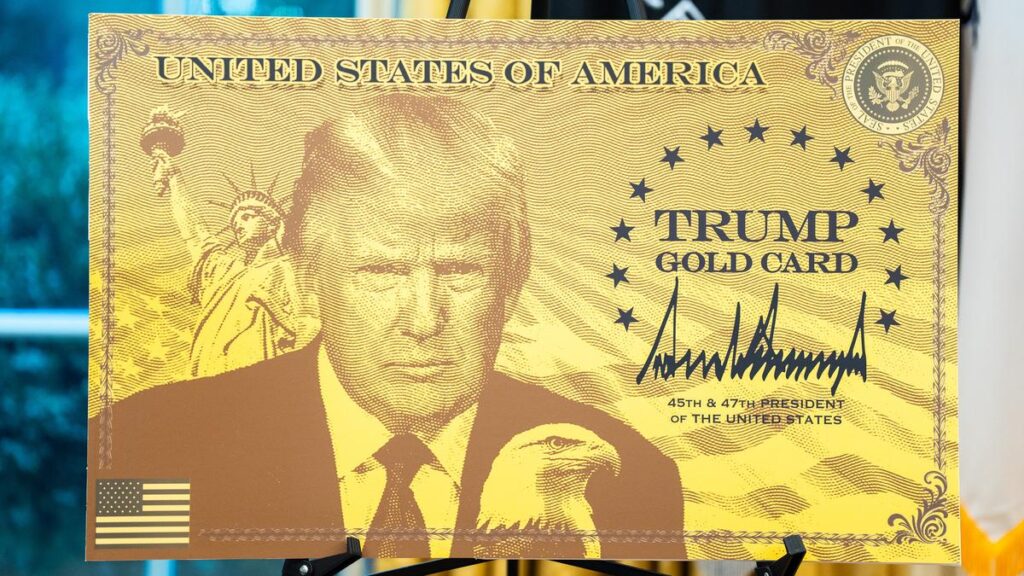
A replica “Trump Gold Card” on display Friday in the Oval Office. MUST CREDIT: Demetrius Freeman/The Washington Post
BREAKING: President Donald Trump has just announced a hefty $100,000 annual fee for H-1B visa applicants, a major shift impacting high-skilled workers in the U.S. This new policy, unveiled earlier today, significantly constrains a critical immigration pathway favored by tech companies in Silicon Valley. Additionally, Trump introduced a $1 million ‘Gold Card’ program for wealthy foreigners seeking U.S. residency.
In a move that could reshape the landscape of legal immigration, Trump’s executive order aims to raise funds while tightening immigration controls. “We’re going to have great people coming in and they’re going to be paying,” Trump said during the announcement. He added that the revenue generated will be used to reduce taxes and debt, underscoring an urgent need to bolster government finances.
The H-1B visa program, crucial for over half a million skilled workers in the U.S., is now under threat. Applicants will face a fee each year, amounting to $600,000 over six years if their visa is renewed. Commerce Secretary Howard Lutnick indicated that companies will need to reassess their hiring strategies, stating, “The company needs to decide… is the person valuable enough to have a $100,000-a-year payment to the government?”
This initiative could dramatically reduce the number of foreign workers in sectors like technology, healthcare, and education, potentially exacerbating labor shortages. Critics from both left and right have expressed concern that this shift may exploit overseas workers or further limit opportunities for American job seekers.
The Gold Card program allows foreigners to pay $1 million for residency, with companies able to sponsor employees via a $2 million ‘Corporate Gold Card.’ This controversial measure has already sparked widespread debate regarding its implications for national security and the ethics of “selling” residency.
Legal experts predict immediate challenges to these policies. According to David Bier from the Cato Institute, only Congress has the authority to alter visa programs, making the legality of Trump’s actions uncertain. If upheld, these changes may shift the focus of immigration policy toward attracting only high-wealth individuals.
The tech industry, historically reliant on the H-1B program, has remained notably silent since the announcement. Industry leaders, who previously criticized Trump’s immigration policies during his first term, appear to be reassessing their stance. The absence of a vocal response could signal a complicated relationship between tech giants and the new administration.
Trump’s administration aims to collect more than $100 billion in revenue from the Gold Card initiative and potentially $1 trillion from the Platinum Card program, which would allow residency for a fee of $5 million. However, experts are skeptical of these projections, questioning the viability of such programs in attracting foreign investment.
The implications are profound: tech companies, the largest beneficiaries of H-1B visas, may find operational costs soaring and face challenges in filling critical roles. Universities and research institutions, heavily dependent on skilled foreign faculty, may also struggle to maintain their workforce.
With Amazon listed as the top beneficiary of H-1B visas, employing over 3,800 new workers last year, these changes could ripple through major industries across the nation. As the administration pushes forward with these policies, the potential fallout on labor markets and innovation remains uncertain.
As the situation develops, stakeholders across the spectrum are urged to stay informed and engaged. The urgency of these changes cannot be overstated, with implications that will reshape the future of work and immigration in the United States.
For now, the nation watches closely as these unprecedented policies unfold, and the debate over the future of immigration continues to heat up.





